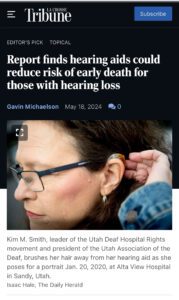EDITOR’S PICK TOPICAL
Report finds hearing aids could reduce risk of early death for those with hearing loss
- Gavin Michaelson
- May 18, 2024
A new study has found proactively addressing hearing loss early can increase a person’s lifespan. As people age, hearing loss becomes increasingly common and can sometimes have significant effects on a person’s quality of life.
The study found adults with hearing loss who regularly use hearing aids have a 24% lower risk of early death than those who never wear them, according to the USC Caruso Department of Otolaryngology—Head and Neck Surgery.
“A lot of studies are coming out now looking at the impact of hearing and hearing loss on quality of life, including cognition, socialization and everything,” said Dr. Rebecca Younk of Beltone Hearing Aid Center in Onalaska. “What the researchers are looking at with hearing loss is that people oftentimes are less likely to socially, be socially active, so they are more likely to isolate from friends and loved ones. They’re less likely to go out and do activities because of their hearing loss.”
The study identified 237 people who regularly wear hearing aids, and 1,483 who did not. Regardless of variables such as degree of hearing loss, age, ethnicity, income, education, medical history and other demographics, the results stood strong. Janet Choi, who conducted the study, speculates that improvements in mental health and cognition stemming from improved hearing can promote better health overall.
According to Younk, people who are socially isolated are more likely to develop mental health issues such as depression and anxiety, which can increase the risk of early death.
“Hearing loss is not the cause of death, what is happening is that individuals that treat their hearing loss are more active and socially connected with their loved ones and friends, and less likely to have anxiety or depression due to hearing loss,” said Younk.
The World Health Organization reports that rehabilitation, such as hearing devices and technology, speech and language therapy and counseling, can help people with hearing loss to function at their optimum.
Younk said this is primarily applicable to people who developed hearing loss post-lingual or later in life, meaning people who were not born deaf or had developed hearing loss at a young age.
She notes that since much of society has normalized hearing loss as a sign of aging, many people are less likely to address the hearing loss early. But seeking guidance from medical professionals early can help teach people how to conserve their hearing, and help make positive and healthy habits early.
“I’m starting to see younger and younger people asking questions and coming in for hearing tests earlier to talk about to talk about the importance of hearing loss in their life,” said Younk. “That is a common thing I’m hearing now for the younger people that are coming in. They’re being fit with hearing aids, and they’re saying, ‘I can’t believe I didn’t do this sooner.’”
Gavin Michaelson News Reporter
